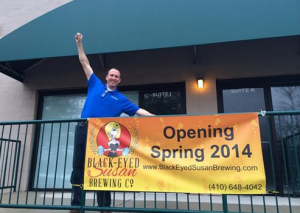This post was contributed by Brian England. For the past 35 years, he has owned and operated British American Auto Care in Columbia, MD.
Forty years ago, when we moved to Columbia, we lived in Oakland Mills. Our village center was compact, but it had everything we needed on a weekly basis: a grocery store, baker, photo shop, liquor store, butcher, pizza shop, restaurants, a bank and a hardware store — all just a mile away.
Then along came the first of the big box stores, a large hardware store called Hechinger. It spelled the end for Columbia’s two local hardware stores. Over the years we have lost a lot to the big box stores. We’ve lost book stores, drug stores, and record stores, but now things are cycling back. At a recent meeting with fellow small business owners from around the U.S., I met a lady that is opening small hardware stores in Baltimore and Washington. I spoke with someone else that had opened two successful book stores in Frederick. The trend is swinging back to small, locally owned businesses. The Washington Post recently highlighted one of the retail segments experiencing the “back to small wave”, coffee shops.  In D.C, a younger, more affluent crowd is opting for smaller, independent coffee shops that offer more of a specialty product, and these independent coffee shops are giving national chains a run for their money. There is a similar trend with breweries. Pubs with breweries are taking off, and local breweries are opening up in America at a rate of 1200 a year. In fact, we have three local breweries opening this year in Howard County.
In D.C, a younger, more affluent crowd is opting for smaller, independent coffee shops that offer more of a specialty product, and these independent coffee shops are giving national chains a run for their money. There is a similar trend with breweries. Pubs with breweries are taking off, and local breweries are opening up in America at a rate of 1200 a year. In fact, we have three local breweries opening this year in Howard County.
Yes, the trend is shifting back to small, local businesses rather than more and more large/big box stores. What’s great about this is it’s more aligned with a sustainable local economy.
The internet has played a part in forcing some of the big box stores to close, as some sales have shifted away from brick and mortar retailers. One of the results of those closures is that many towns are left with large buildings that can’t be easily re-purposed. Not only do communities have to deal with blight when the big retailers leave, there are also issues when they come in. There are towns like Brunswick and Frederick and counties like Harford that are dealing with the blight caused by the mega gas stations that have moved in. (A mega gas station is one that sells from four to six times more gas than a traditional, local station.) Brunswick has gone from five local gas stations to one mega station. Frederick has many blighted sites, and Route 1, from the Pennsylvania line to the Baltimore county line, has lost all of its local gas stations to mega stations.
The Hamilton community in Baltimore began fighting back against this trend when Royal Farms wanted to put a mega gas station right in the middle of their residential community, across the street from a library. This informal group of residents and their allies decided to take a stand to oppose the proposed Harford Road development, but it hasn’t been an easy battle. The local community faced seven Royal Farms attorneys and a local councilman at a zoning hearing. Fortunately, they won the first round. For more on their fight to preserve the integrity of their community check out www.norofohamilton.com.
The terrible thing is, these large mega stations are trying do the same thing in Howard County. Royal Farms wants to open seven gas stations in Howard County. That would result in half of the 70 gas stations operating now closing down. Yes, 35 stations would close, leaving blight all across the county. Some say this is great; we will save on gas! Well, visit the towns that have these mega stations, and you will see the prices have gone back up. The towns don’t get the benefit of reduced gas prices, and they have the added burden of having to deal with the increased cost of managing the blight left behind by the closed stations. It is time for communities to realize that bigger isn’t always better, and it isn’t always cheaper. There are hidden costs to pay.
On the reverse side, the trend back to small is enhancing our local communities. The money spent in local businesses is much more likely to stay in the community. It churns round and round building a more sustainable local economy. When we add to this, the impact of people buying local produce from farmers markets and more people wanting to start community gardens we sow the seeds for not only a healthy local economy, but also a healthy local community.
